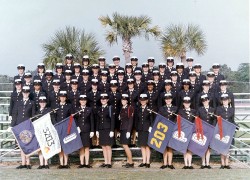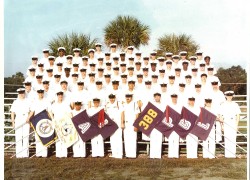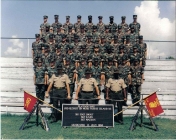Specialty Summary. Manages and performs public health activities and programs. Included are food safety and defense inspection; sanitation; medical entomology programs; vector borne, communicable, and occupational disease prevention and control; public health medical readiness activities; and promoting and providing health education and training. Applies medical standards for initial and continued qualification of all Air Force members. Provides administrative oversight to the Preventive Health Assessment and Individual Medical Readiness (PIMR) Program and the related Occupational Health Physical Examinations Program (including audiograms). Provides medical intelligence through preventive medicine briefings and pre- and post-deployment surveillance activities and assists with medical processing for all deploying personnel.
Duties and Responsibilities:
Conducts food safety and defense programs. Inspects sanitary condition of containers and vehicles. Ensures food origin and distribution are from approved sources. Inspects foods for wholesomeness and contract compliance. Makes recommendations for disposition of deteriorated or distressed foods. Assesses risks associated with production, transportation, storage, preparation and serving of food. Recommends measures to prevent contamination (unintentional as well as intentional) and deterioration. Inspects operational rations. Collects and ships food for laboratory analysis. Investigates customer complaints and food recalls. Evaluates and completes inspection records.
Plans and conducts sanitation programs. Conducts sanitary evaluations of food, public facilities, and military and civilian contract aircraft. Determines compliance with sanitary standards and reports discrepancies. Provides food handler, disease outbreak, and community health education and training.
Organizes and assists in communicable disease prevention and control programs. Controls disease transmission through patient interviews, epidemiological investigations, patient education and community outreach programs. Advises professionals on control measures. Updates and completes associated records and forms. Investigates disease outbreaks. Collects and compiles epidemiological data. Identifies, evaluates and reports trends.
Provides administrative oversight to the PIMR program. Gathers data, produces rosters and reports for Primary Care Management Teams, Unit personnel and both medical and line leadership. Provides immunizations policy input to the Population Health Function.
Assists in Occupational Health Programs. Ensures personnel receive appropriate pre-employment, periodic and termination occupational examinations Conducts occupational audiometric evaluations. Provides consultation to supervisors and workers in personal hygiene, occupational hazards, hazard communications and personal protective equipment. Monitors results of occupational health examinations to detect adverse trends. Investigates occupational illnesses. Advises healthcare providers on workplace hazards. Manages and provides quality control of occupational health examinations. 2.6. Plans and conducts medical entomology program. Evaluates risk of vector borne disease. Conducts disease and pest and vector surveillance. Monitors compliance and effectiveness of vector and pest management control programs. Recommends prevention and control measures. Provides education and training on prevention and control of vector borne diseases.
Plans, organizes, and conducts public health medical readiness programs. Prepares and conducts medical intelligence preventive medicine briefings. Conducts programs to reduce health risk from communicable diseases, food, improper field hygiene and sanitation, and environmental exposures.
Assists healthcare provider teams with interpretation and application of medical standards to determine medical qualifications for occupational duty, worldwide duty, mobility status, flying status, and special duty. Provides administrative management of duty limiting condition.
Specialty Qualifications:
Knowledge. Knowledge is mandatory of: basic biological and physical sciences; preventive medicine; fundamentals of microbiology, chemistry, anatomy, physiology, and pathology of the human body; terminology, medical standards, duty limiting conditions, medical entomology programs; food science and technology; food handler training; food and water safety and defense principles; food inspection; laboratory procedures; sanitary evaluations; public facility sanitation; prevention and control of food borne, waterborne, and vector borne diseases; communicable disease prevention and control; epidemiology; occupational health (including hearing conservation); medical readiness (including medical intelligence, deployment processing, and deployment surveillance); personnel management and administration; medical service organization and function; basic medical information management (including database management) and written and oral communication.
Education. For entry into this specialty, completion of high school courses in biology, chemistry, and general science is desirable.
Training. For award of AFSC 4E031, completion of public health apprentice course is mandatory.
Experience. The following experience is mandatory for award of the AFSC indicated:
4E051. Qualification in and possession of AFSC 4E031. Also, experience in functions such as routine food safety and defense inspection; sanitary evaluations; communicable disease control and disease intervention; occupational health; force health management activities, medical entomology programs and public health medical readiness programs.
4E071. Qualification in and possession of AFSC 4E051. Also, experience performing public health programs.
4E091. Qualification in and possession of AFSC 4E071. Also, experience managing public health activities.
Other. The following are mandatory as indicated: For entry into this specialty: Normal color vision as defined in AFI 48-123, Medical Examinations and Standards. Qualification to operate government vehicles according to AFI 24-301, Vehicle Operations. For award and retention of AFSCs 4E051/71/00 must maintain an Air Force Network License according to AFI 33‑115, Vol 2, Licensing Network Users and Certifying Network Professionals.




